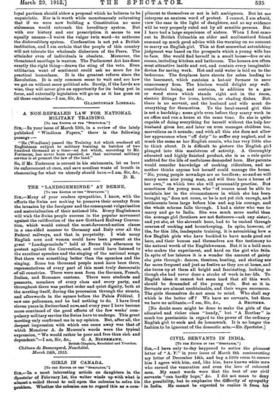GIRLS IN CANADA.
[To THE EDITOR 01 THE “BrEcrAma.”] Siss—In a most interesting article on daughters in the .Speetafer of February let, the writer winds up with what is almost a veiled threat to call upon the colonies to solve his problem. Whether the colonies are to regard this as a come plitnent to themselves or not is left ambiguous. But let me interpose an anxious word of protest. I cannot, I am afraid, view the case in the light of daughters, and so my evidence will be very properly ruled out by all sensible persons. But I have had a large experience of sisters. When I first came out to British Columbia an older and acclimatized friend summed up much good advice with the warning on no account to marry an English girl. This at first somewhat astonishing judgment was based on the prospects which a young wife has. to face. She would find herself in a small house—five or six rooms, including kitchen and bathroom. The houses are often most attractive inside and out, and contain every imaginable device for saving work. Hot and cold water is laid on to the- bedrooms. The fireplaces have shoots for ashes leading to the basement, which centains a hot-air furnace to save- unnecessary fires. The kitchen would delight any well- constituted being, and contains, in addition to a ga& or wood stove which stands right out in the room, electric fittings for irons, kettles, or chafing dishes. But there is no servant, and the husband and wife must do everything for themselves. To the local-reared girl this is not a hardship ; some girls even before they marry work in an office and run a house at the same time. So she is quite- capable of doing everything for herself without the help her husband gives her, and later on even manages children too, marvellous as it sounds; and with all this she does not allow her appearance when "off duty" to suffer any neglect, and is- much the same as her English cousin, who has very little else to think about. It is difficult to picture the English gir3 plunged into this maelstrom of activity. A thoroughly educated and highly finished product, she is as it rule quite unfitted for the life of usefulness demanded here. Her parents, would consider knowledge of cooking ridiculous, and no. mother thinks anyone but herself could manage the house. "No, young people nowadays are so heedless ; so-and-so will marry some nice young man, and will then have a house of her own," on which two she will presumably practice. Bult sometimes the young man, who "of course must be able to maintain. her in the circumstances in which she has been brought up," does not come, or he is not yet rich enough, and settlements loom large before him and sap his courage, and the whole scheme falls through. I had a sister who was to. marry and go to India. She was much more useful than the average girl (brothers are not fiatterers—ask any sister), and yet she, at the eleventh hour, had to be rushed throughi courses of cooking and housekeeping. In spite, however, or the, for this life, inadequate training, it is astonishing how a few English girls who have buckled to have made good out here, and their houses and themselves are fine testimony to. the natural worth of the Englishwoman. But it is a bold man who makes the experiment, and hard on the girl who fails. In spite of her labours it is a wonder the amount of gaiety she gets through : dances, theatres, boating, and skating are far more frequent and just as festive as they are at home, and she turns up at them all bright and fascinating, looking as though she had never done a stroke of work in her life. To- English ideas it cannot but seem hard that all this work should be demanded of the young wife. But so it is. Servants are almost unobtainable, and their wages enormous. The girls themselves do not seem to mind. Who shall say which is the better off ? We have no servants, but them
we have no militants.—I am, Sir, &c., I BROTHER.
[No doubt more might be done to make the girls of the educated and richer class "handy," but "A Brother" much too pessimistic in regard to the power of the ordinary English girl to cook end do housework. It is no longer the fashion to be ignorant of the domestic arts.—En. Spectator.]










































 Previous page
Previous page